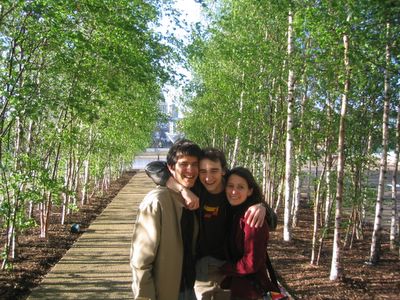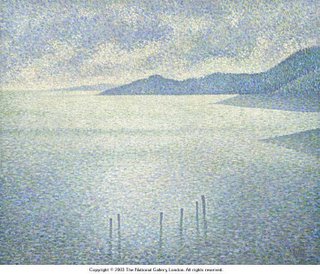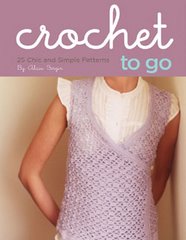
Clement, Eric, and Alicia in front of the Tate Modern.
Have I mentioned that I'm not a big fan of modern art? I keep trying, but it's just not getting any better. I don't like to have to work to "get" art--I want to see it and appreciate it, ideally learn something, but not have to solve a puzzle. So the Tate doesn't get a thumbs up (although it's certainly worth visiting to see and walk across the millennium Bridge).
London's other museums? Fabulous. I kept my list small and managed to make it through most of the British Museum and all of the National Gallery and National Portrait Gallery. It's hard to choose the best one from the group--I think each are worthwhile for different reasons. The British Museum has some of the best artifacts I've ever seen. Mummies? Dozens. Most of Athen's Acropolis? It's in London. The Rosetta Stone? Yes, that too. Clearly the British know how to get their hands on stuff. There were signs throughout about this fact that I enjoyed quite a bit, most of which said something like "if this was in [fill in name of original country] it would be damaged by pollution/strife/civil unrest/exposure to the elements, so it's better that it lives in England."
As a side note, it's wonderful to be in a country that speaks your language! Even if I couldn't understand many of the speakers (really thick accents), I could read all of the signs.
I used audio guides in the National Gallery and Portrait Gallery, both excellently done and invaluable. The National Gallery is almost overwhelming in size, scope, and quality, though doable in 3-4 hours. Important pictures are marked ("featured painting") for dummies like me that have a little trouble focusing. A painting I hadn't seen before but really liked is "A Coastal Scene" by Theo Van Rysselberghe:

Of the two, I think I preferred the Portrait Gallery. The quality of the art isn't as high, but the audioguide gives you the life story of nearly every person portrayed. In some cases, it even gives you an excerpt of the person him/herself speaking. It's a wonderful introduction to British history. I spent a lot of time in the writers section--Beatrix Potter, Jane Austen, Mary Shelley.


No comments:
Post a Comment